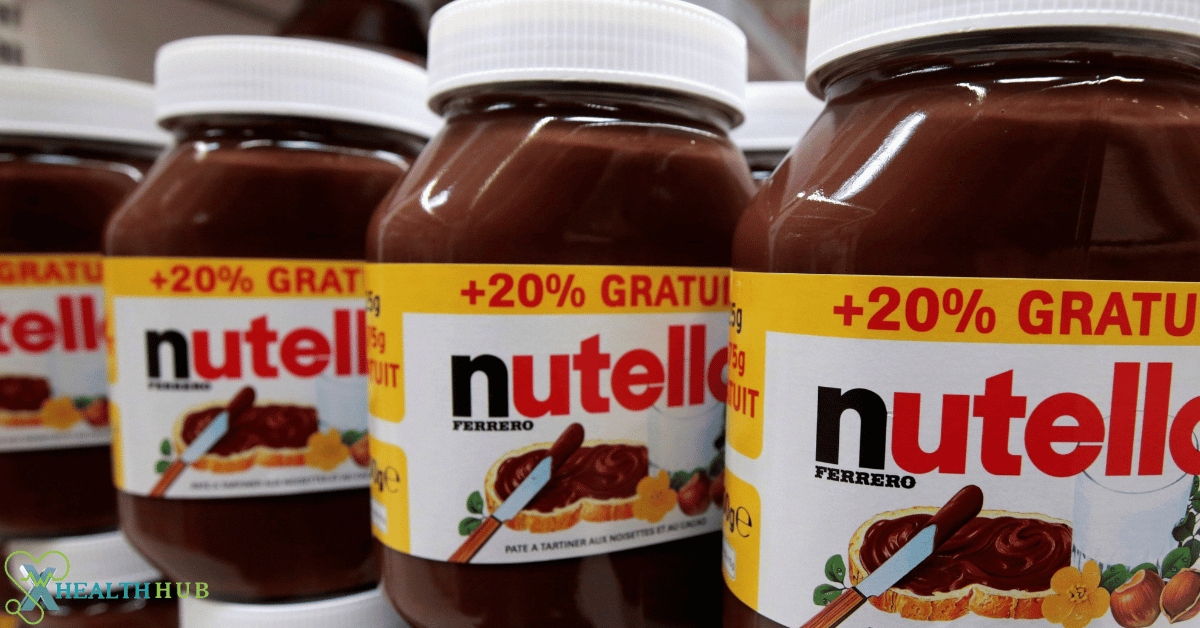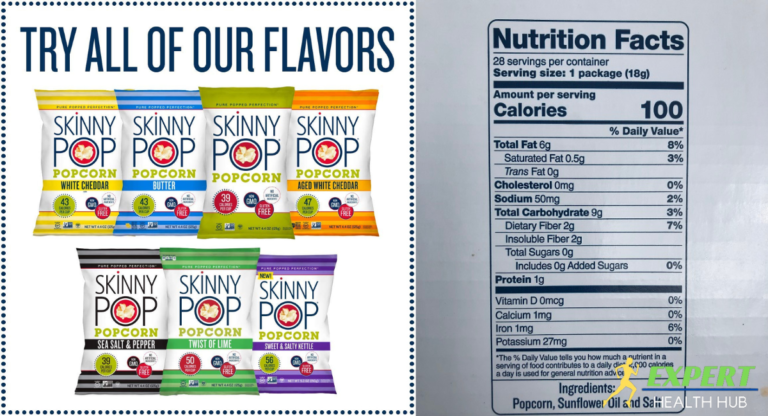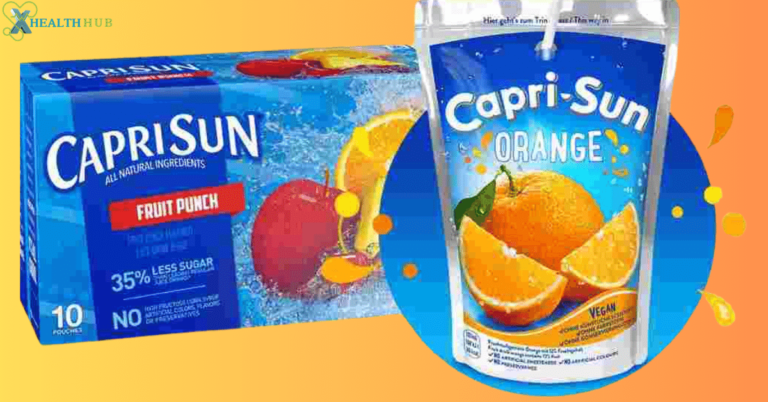Nutella Nutrition Facts: What You Need to Know
Nutella Nutrition Facts:
Introduction: A Sugary Symphony Encased in Glass
this is the best article ever written on Nutella nutrition facts After reading this article, you will not need to get information from anywhere about Nutella nutrition facts.
Salutations to all my fellow travelers from the Nutella universe! Get ready for an exhilarating journey inside the legendary world of the most widely consumed hazelnut spread worldwide. If you will, picture an uncovered jar nearly overflowing with rich, chocolate-flavored ambrosia. Since it was initially released in 1964, this combo has won over many hearts in addition to palates.
Consider the creation of Nutella by Ferrero, who was prompted to create it by the lack of cocoa after World War II. They had no notion that what they were creating would be considered a culinary masterpiece for many years to come.
Pro tip: Learn more about Starbucks Egg White Bites Nutrition
Delving into the Enigmatic Ingredients of Nutella
Let us embark on a grand quest to unveil the mysterious treasures concealed within the iconic Nutella jar:
Roasted Hazelnuts: Unsung Heroes of the Nutella Saga
Ah, the unassuming hazelnuts—true champions of the Nutella tale! These petite powerhouses pack a punch with their rich, nutty essence and velvety texture. Imagine a symphony of flavors pirouetting upon your palate with every delightful dollop of Nutella!
Cocoa Powder: The Alchemical Elixir of Nutella
Marvel, readers, at cocoa powder—the mysterious component that gives Nutella its rich chocolate flavor. You’re going to be taken to a world of delectable chocolate with this blend of rich, flavorful cocoa beans; it’s not just regular cocoa.
Sugar: The Melodious Backbone of Nutella’s Flavor
Ah, sweet, sweet sugar—our perennial companion! A key ingredient in Nutella is sugar, which gives it its enticing sweetness and keeps us coming back for more. It satisfies your senses like a sweet serenade!
Palm Oil: The Silken Conductor of Nutella’s Texture
Enter palm oil, the unsung luminary orchestrating Nutella’s creamy consistency. This silky elixir ensures Nutella remains spreadable and tantalizingly delicious—a maestro of smoothness in the Nutella universe!
Pro tip: Learn more about Panda Express Orange Chicken Nutrition
Deciphering the Nutritional Enigma of Nutella
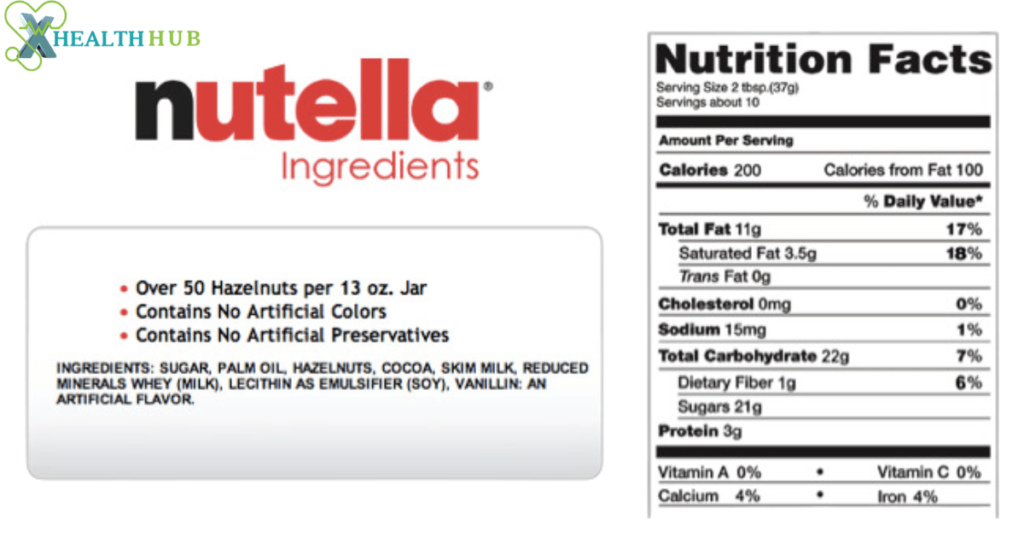
Now, let us embark upon an odyssey through the nutritional cornucopia that Nutella presents:
Calories: A Harmonious Symphony of 200 Calories
Ah, the humble calorie—a mere 200 per two-tablespoon serving of Nutella. It’s like a melodious dance upon your palate, each calorie a note in the symphony of flavor!
Fat: A Nutty Overture of 11 Grams
Nutella brings to the table a harmonious 11 grams of fat, imparting that velvety richness we all adore. A Nutella-infused embrace for your taste buds!
Carbohydrates: A Sweet Sonnet of 21 Grams
Ah, carbohydrates—the lifeblood of energy we crave! Nutella delivers approximately 21 grams per serving, primarily from its delectable sugary essence. A burst of vitality, keeping you in rhythm throughout the day!
Protein: A Melodic Duet of 2 Grams
A modest 2 grams of protein are present in every serving of Nutella—a delightful surprise concealed within its creamy embrace!
Vitamins and Minerals: A Nutritional Overture
Nutella transcends mere flavor, bestowing upon us a sprinkle of calcium and iron. A symphony of essential nutrients, each spoonful a step towards a healthier, happier you!
Pro tip: Learn more about Skinny pop nutrition label
Hazelnuts: The Nutty Marvels of Nutella
Let us offer a standing ovation to hazelnuts—the unsung luminaries behind Nutella’s enchantment:
Heart Health: A Nutella Love Sonnet to Your Heart
Hazelnuts abound in heart-healthy monounsaturated fats, tenderly nurturing your cardiovascular well-being. A love letter to your heart with every Nutella indulgence!
Antioxidants Galore: A Nutty Sojourn for Your Cells
Hazelnuts brim with antioxidants, stalwart warriors against pesky free radicals. A heroic skirmish within your body, with hazelnuts leading the charge!
Nutrient Powerhouse: A Nutella Symphony of Vitamins and Minerals
The humble hazelnut is hiding a wealth of important nutrients, so don’t undervalue it. A journey towards health and vitality with a Nutella twist!
Pro tip: Learn more about Starbucks egg white bites nutrition
Cocoa: The Chocolatey Maestro of Nutella
Let us now illuminate the spotlight upon cocoa—the virtuoso behind Nutella’s luscious flavor:
Antioxidant Magic: A Nutella Odyssey for Your Health
Cocoa bursts forth with antioxidants, fortifying your immune system and repelling free radicals. A Nutella-infused battle royale within your very being!
Mood Booster: A Nutella Serenade for Your Soul
Ever pondered the euphoria Nutella imparts? Credit cocoa’s mood-enhancing properties, enveloping you in a Nutella-inspired embrace for your soul!
Improved Blood Flow: A Nutella Rhapsody for Your Circulation
Cocoa’s flavonoids enhance blood flow, ensuring your heart beats in tune with life’s rhythm. A Nutella-infused waltz for your veins!
Pro tip: Learn more about Panda Express Orange Chicken
The Sugar Story: A Sweet Melody in Every Jar
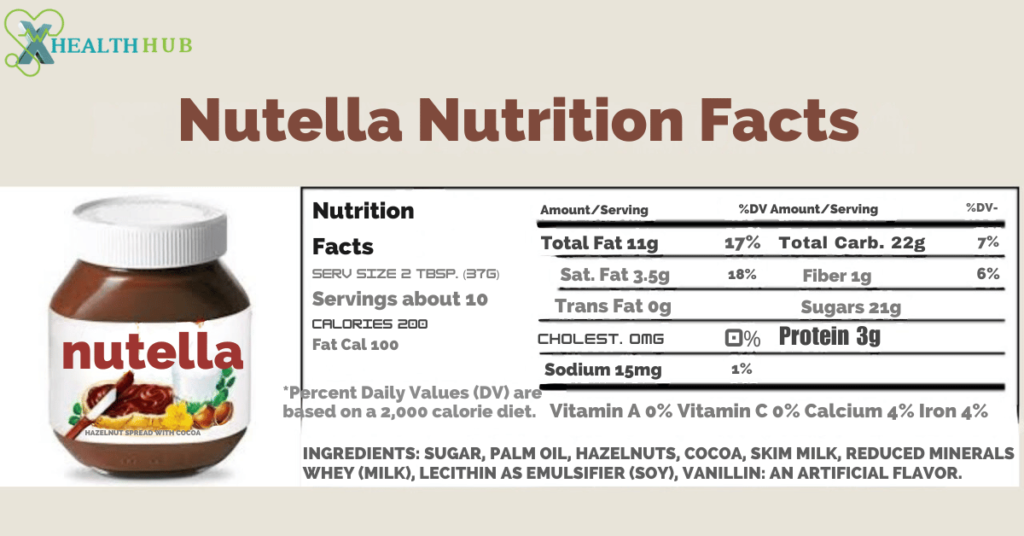
Let us not evade the truth—Nutella wields sugar, a delicious cog in its symphony:
Sweet, Sweet Sugar: A Nutella Aria of 20 Grams
Approximately 20 grams of sugar grace each serving of Nutella, bestowing upon it that irresistible sweetness we crave. A sweet serenade for your taste buds!
Sweet Treats: A Nutella Ballad of Flavor
Whether slathered on toast or cascading over pancakes, Nutella remains a sweet delight, illuminating any repast. A Nutella-inspired journey through culinary wonder!
Pro tip: Learn more about Chick Fil a Grilled Nuggets Nutrition
The Palm Oil Predicament: A Silken Sojourn in Every Jar
Let us converse on palm oil—the unsung luminary behind Nutella’s creamy allure:
Silky Smoothness: A Nutella Sonata for Your Senses
Palm oil imparts Nutella its silken, spreadable texture—gliding effortlessly over your chosen delicacies. A Nutella-inspired ballet upon your taste buds!
Environmental Consciousness: A Nutella Overture of Sustainability
Ferrero, guardians of Nutella’s legacy, pledges to source sustainable palm oil—treading lightly upon the earth. A Nutella-inspired expedition towards a verdant tomorrow!
Pro tip: Learn more about Uncrustables Nutrition
Nutella vs. Other Spreads: The Epicurean Showdown

Yet, Nutella stands not alone in the realm of spreads, facing formidable challengers:
Peanut Butter: A Nutella Duel with the Nutty Adversary
Peanut butter, with its earthy charm, offers a savory alternative to Nutella’s sweet embrace. A Nutella versus peanut butter epic for your taste buds!
Almond Butter: A Nutella Encounter with the Refined Sophisticate
Almond butter, a creamy, nutty rival to Nutella’s chocolatey allure. A Nutella-inspired voyage into the land of nutty delights!
Fruit Preserves: A Nutella Adventure with the Sweet and Tangy
Fruit preserves, bursting with fruity fervor, offer a sweet departure from Nutella’s chocolatey opulence. A Nutella-inspired voyage into the land of fruity delights!
Pro tip: Learn more about Taco Bell Chicken Quesadilla Nutrition
Incorporating Nutella into Your Daily Odyssey
How might one savor the full essence of Nutella’s allure? Let us explore the possibilities:
Spread the Love: A Nutella Affair on Toast
Slather Nutella upon your favored toast—a simple yet decadent ode to breakfast bliss. A Nutella-inspired dalliance with your morning routine!
Dip and Dive: A Nutella Plunge for Fruits and Delicacies
Utilize Nutella as a dip for succulent fruits like strawberries or bananas, or immerse pretzels and cookies in its sweet embrace. A Nutella-infused soiree in every bite!
Bake and Create: A Nutella Symphony in the Kitchen
Venture into the realm of Nutella-inspired recipes—stuffed cookies, swirled brownies, or perhaps a Nutella-laden cheesecake. A Nutella-fueled culinary gala in your kitchen!
Pro tip: Learn more about How to Boost Immune System while Taking Methotrexate
Dispelling Nutella Myths: Unraveling the Enigma
Let us now dispel the mist veiling common Nutella misconceptions:

Myth: Nutella is a Solely Morning Indulgence
Ah, an erroneous notion! Nutella transcends temporal constraints, a companion for all hours. A Nutella-infused odyssey, unbound by the clock!
Myth: Nutella is a Health Pariah
Whilst not a health elixir, Nutella can be savored within a balanced diet—embracing moderation as its ally. A Nutella-inspired harmony of taste and prudence!
Myth: Nutella is reserved for juveniles.
Adults revel in Nutella’s allure as much as their youthful counterparts! A timeless classic, evoking joy across generations. Who can resist the siren call of Nutella’s chocolatey allure?
Pro tip: Learn more about Weight-gain supplements
Nutella for Every Palate: A Symphony of Flavorful Inclusion
Irrespective of dietary predilections, Nutella extends a hand of delectable embrace:
Vegans Rejoice: A Nutella Sojourn for Plant-Based Pilgrims
Nutella, bereft of dairy, stands as a sweet offering for the vegan spirit. A Nutella-infused journey into the verdant realms of plant-based delight!
Gluten-Free Delights: A Nutella Sonata for the Gluten-Averse
For those wary of gluten’s embrace, fear not—Nutella awaits, entirely gluten-free. A Nutella-inspired celebration of deliciousness, sans gluten’s bounds!
Pro tip: Learn more about Gatorade Zero Nutrition Facts
Nutella and Children: A Tale of Sweet Mirth
Children and Nutella—a whimsical pas de deux! Herein, are delightful ways to engage with Nutella’s enchantment:
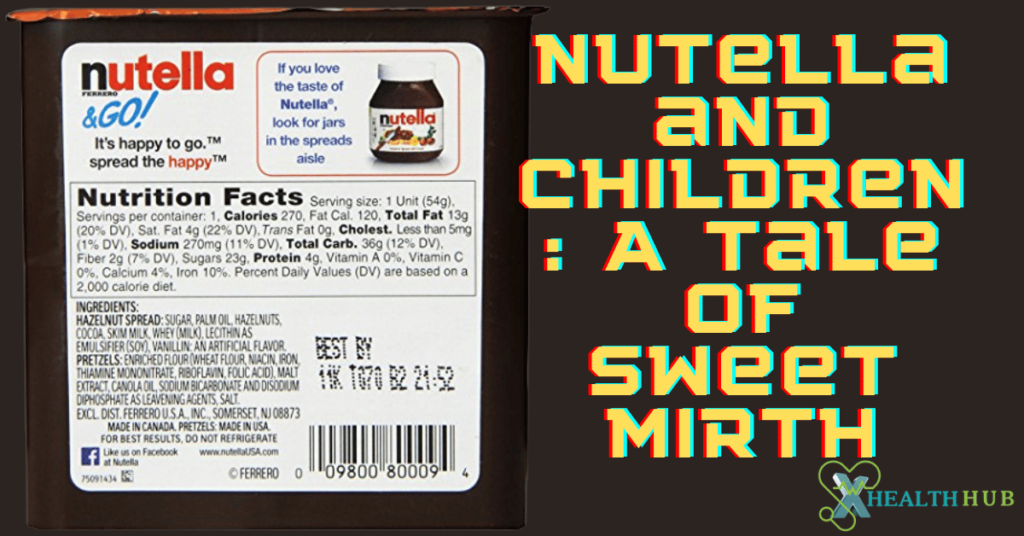
Parental Magic: A Nutella Frolic for Young Hearts
Seeking a swift and delightful repast? Nutella upon apple slices, crackers, or perhaps straight from the jar—a sweet embrace for your little ones!
Creative Cooking: A Nutella Symphony with Young Maestros
Enlist your budding chefs in Nutella-inspired creations—stuffed French toast, banana smoothies, or swirled muffins. A Nutella-fueled ballet of creativity and joy!
Pro tip: Learn more about Protein Shakes Near Me
Addressing Allergies and Sensitivities: A Nutella Safety Sonata
For those navigating allergies or dietary constraints, Nutella offers myriad avenues:
Allergen Alert: A Nutella Safety Waltz for Allergic Guardians
Nutella, housing hazelnuts and milk, remains unsuitable for nut or dairy sensitivities. A cautionary dance, urging vigilance and alternative paths.
Alternative Spreads: A Nutella Symphony of Options
Thankfully, a plethora of nut-free and dairy-free chocolate spreads beckon—crafted from sunflower seeds, soy, or coconut. A Nutella-inspired flourish, offering choice and delight!
Pro tip: Learn more about Lipton Hard Tea Nutrition Facts
Navigating Nutella’s Nutrition Label: An Enlightened Aria
Reading nutritional labels can confound, yet fret not! A guide to Nutella’s nutritional bounty:

Serving Size: A Nutella Melody for Portion Awareness
Adhere to recommended servings for a harmonious experience. Two tablespoons of Nutella—a melodious note to your portion acumen!
Calories and Macros: A Nutella Overture of Nutrition
Mindful of calorie, fat, carbohydrate, and protein content per serving—wise choices abound. A Nutella-inspired dance of balance and indulgence!
Ingredients List: A Nutella Symphony of Purity
Seek whole-food ingredients, eschewing added sugars, artificial colors, and preservatives. A Nutella-inspired pilgrimage to unadulterated chocolate bliss!
Pro tip: Learn more about 2 Scramblеd eggs nutrition facts
Nutella’s Global Influence: A Symphony of Cultural Exploration
Nutella, is not merely a spread but a cultural marvel adored worldwide:
International Delights: A Nutella Odyssey Across Nations
Explore the global tapestry of Nutella’s integration into traditional fare—from France’s Nutella-filled crepes to Italy’s Nutella-stuffed pastries. A Nutella-infused world tour from your kitchen!
DIY Nutella Creations: A Nutella Rhapsody of Culinary Ingenuity
Embark upon personal Nutella-inspired quests at home! Swirled pancakes, stuffed cookies, or atop ice cream—the journey unfolds. A Nutella-fueled fete, limitless in scope!
Conclusion: A Nutella Farewell and Playful Coda
you learn completely about Nutella nutrition facts In summation, Nutella emerges not solely as a spread but as an orchestration of flavor, texture, and epicurean delight. Whether adorning toast, enhancing fruits, or savoring a solo, Nutella promises a symphony of hazelnut-chocolate bliss.
Embrace a spoonful of Nutella joy, inviting your palate on a whimsical odyssey. Whether novice or enthusiast, each Nutella moment unveils a sweet serenade for the senses!
Pro tip: Learn more about white claw nutrition facts
Unique Nutella FAQs: A Mirthful Cacophony of Curiosity
Q1: Is Nutella a Cure for the Mundane?
Ans: Oh, if only life were so simple! Nutella, a balm for every day, offers sweetness in the midst of routine. A tiny dollop of joy amidst the mundane!
Q2: Can Nutella Bestow Savory Wonders?
Ans: Indubitably! Nutella’s chocolatey allure lends depth to savory realms—barbecue sauces, chilis, or perhaps a decadent mole. A Nutella-infused twist on savory delights!
Pro tip: Learn more about Twisted Tea Nutrition Facts
Q3: Does Nutella possess mystical powers?
Ans: Ah, a question of the fantastical! Nutella’s enchantment lies in its ability to elevate any dessert to divine status. A sprinkle of chocolatey magic in every bite!
Q4: Is Nutella the ideal workout companion?
Ans: Though not a protein powerhouse, Nutella offers a delightful energy burst pre-workout. Supplement with healthy carbs and proteins for exercise apotheosis. A Nutella-fueled spark for your gym endeavors!
Q5: Can One Indulge in Too Much Nutella?
Ans: Ah, the eternal quandary! While excess Nutella remains a concept unknown, savor each dollop with moderation. A Nutella-inspired revelry, savored in measured delight!
Intrigue and enchantment weave through the Nutella saga—a symphony of flavors, a dance of textures, an epicurean journey through the hazelnut-chocolate rapture. So go forth, dear readers, and embark upon your Nutella odyssey—where each spoonful is a sweet serenade to the senses. If you have any questions related to Nutella nutrition facts, ask me in the comment section
Pro tip: Learn more about OliPop Nutrition Facts
Disclaimer: The whimsical nature of this article aims to evoke joy and culinary curiosity. As with all indulgences, moderation is key. Embrace the Nutella adventure with delight and mirth, for every moment with Nutella is a celebration of sweet serenity.
Pro tip: To learn more about health and fitness-related knowledge, regularly visit Quora, Linked, Twitter, Pinterest, Instagram, YouTube, and Facebook.
